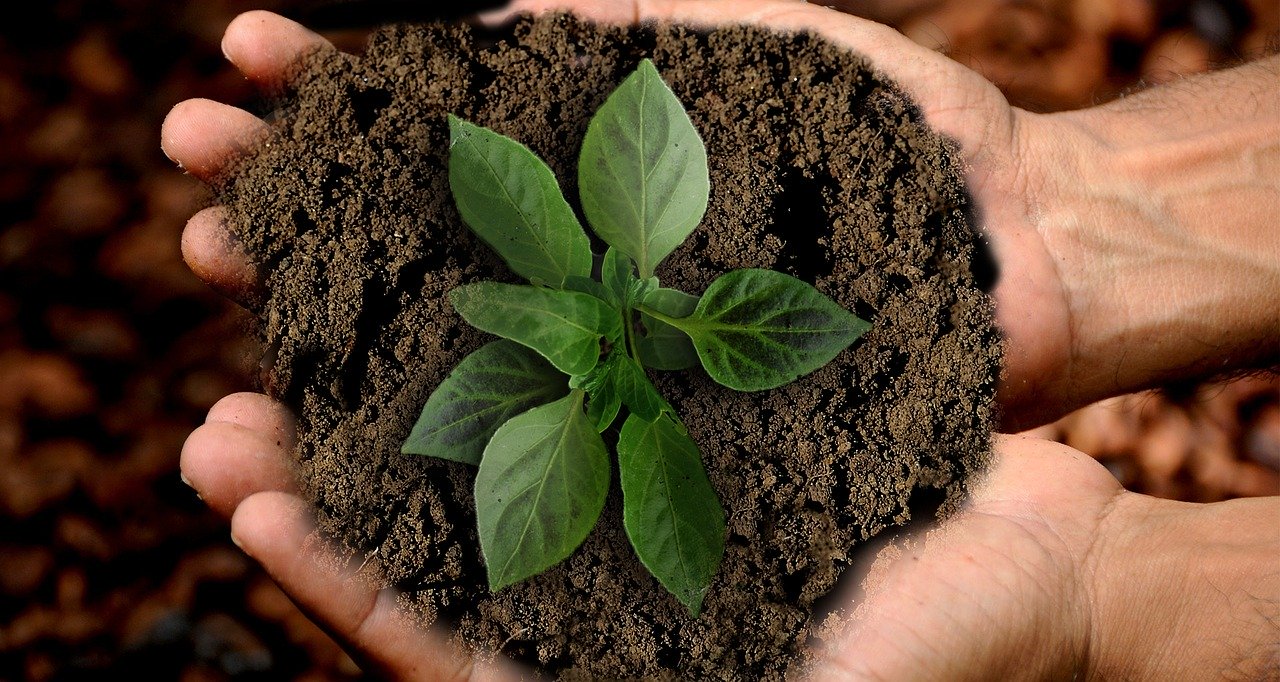As a new gardening season starts, I thought it would be interesting to have a look at just how sustainable gardening and the plant growing industry is. With the current issues of global warming, use of fossil fuels and plastic, I feel it is up to us all to question our everyday use of resources at home and at work and their effect on the environment. For me, this is all about gardening and just how sustainable it is?
Here at Deelish Garden Centre, one of the most talked-about areas regarding sustainability in gardening is the use of peat. I am being asked about peat-free substitutes every week for all uses, from seed sowing to multi-purpose compost. Exploitation of peatlands for fuel has been under way in Ireland for over 400 years. Today traditional turf cutting, mechanical turf cutting and industrial peat extraction have accounted for a staggering loss of 47 per cent of the original area of peatlands in Ireland. This represents over half a million hectares of land. This is not sustainable in any way and alternatives will need to be put in place as soon as possible. Peat is the most damaging fuel in terms of global warming; even worse than coal. Peat was responsible for 3.4 million tonnes of emissions in Ireland during 2016, of which 75 per cent was for electricity and 25 per cent for residential heating. After these findings and continued pressure, state-owned Bord na Móna has committed to getting out of peat by 2030. The interesting figure here is that less than three per cent of peat harvested is used in horticulture and most of that three per cent is used in industrial growing of crops. Around one per cent of the total peat harvested in Ireland is used to fill the peat compost bags you see sold in garden centres! Based on these figures, the best way to protect our peatlands is to lobby for cleaner alternatives to produce electricity and think twice about burning peat products and turning on that light! We do stock some excellent peat free organic composts made here in Ireland. However we are always a bit surprised at how passionate some of our customers get about this issue, and even more surprised that they are happy to use the peat free alternative that has been shipped in from Germany!
Another common problem I am very aware of in the gardening industry is the use of plastic pots. Most of the pots used to house the plants we provide are made of single use black plastic. I have approached many of our suppliers regarding this issue, and I am happy to report at least three of our main suppliers have now started to supply their plants in 100 per cent recyclable pots. I hope to see this figure increase to all our suppliers in the next few years and plan to keep the pressure on to use recyclable pots. For plants that only need to be in a pot for a few months, I see no reason why they cannot be supplied in a biodegradable pot but so far none of our suppliers are providing this service. I have sourced a biodegradable pot for small plants and these are now available here at Deelish. We also encourage our customers to bring back their (clean) used pots for others to reuse, as these pots can be used many times and to only use them once seems like a real waste of resources to us. Ask for the free pots next time you’re in!
Many plants that are grown for the garden centre trade are raised in ‘Intensive horticulture’, using artificial feeds and pesticides. This type of artificial horticulture can adversely affect the soil environment. In this case the basic problem is, the use of very high doses of fertilisers, and the heavy metals contained in some of these fertilisers. Pesticides and weed killers are also used in these intensive growing environments, which all have negative effects on the surrounding soils, including the mycorrhizal fungi, earthworms and many other insects and animals (including humans). According to some estimates, over 98 per cent of sprayed insecticides and 95 per cent of herbicides reach a destination other than their target species. Such undesirable effects have led many pesticides and herbicides to be banned, while regulations have limited and/or reduced the use of others. Over time, pesticides have generally become less persistent and more species-specific, reducing their environmental footprint somewhat. In addition, the amounts of pesticides applied per hectare have declined, in some cases by 99 per cent. Many Irish and European growers are now using natural predators to target specific pests in the growing trade. Another encouraging development in recent years is the use of natural fertilisers and use of mycorrhizal fungi in soils. It is also worth noting the percentage of land used for the growing of plants for the garden centre trade is tiny in comparison to other intensive agriculture and horticulture land use.
Neonicotinoids are a class of insecticides chemically related to nicotine. The name literally means ‘new nicotine-like insecticides’. They are much more toxic to invertebrates, like insects, than they are to mammals, birds and other larger organisms. Many large growers and suppliers of garden centre plants used these chemicals in their compost mixes to avoid damage to their plants from pests, without caring about the effects to our pollinators and other insects that actually help the plants they are trying to protect. Many plants are now specifically labelled as bee or pollinator-friendly, with a picture of a cartoon bumblebee on the label, such as the Royal Horticultural Society (RHS) provide a ‘Perfect for Pollinators’ logo, which can be added to the label of any of the long list of garden plants that they judge to be good for pollinators. The irony is that many of these plants with the logo continued to use these neonicotinoids in the compost! The good news is, from 2018 there has been a European ban and now neonicotinoids can now only be used in greenhouses where the crop stays inside for its entire lifecycle. Many beekeepers are already seeing some positive signs in the last few years and I hope we will all start to see all insects start to increase in numbers over the coming years.
One of the most satisfying parts of working at a garden centre for me is seeing our customers’ gardens grow, literally! There is no doubting that many of the plants we supply are adding to the biodiversity of the local land, as well as feeding and providing shelter for the various creatures we are sharing the landscape with. I love to supply our customers with native trees and plants, as these plants can support a diverse range of our native wildlife, which need all the help they can get. I respect gardeners wanting to plant native species (defined as having been in Ireland at the end of the last ice age). However a garden with only native plants can be a bit limited in many regards. A garden with a healthy mix of native and other plants can greatly increase the availability of food through the year and habitat for the wildlife, as well as the enjoyment of the gardener! A great example was last year when not much else was flowering, our giant Echiums were covered with thousands of pollinators including humming bird hawkmoths, various bumble bees, honey bees and many more. They continued to flower for many months and I am sure the pollinators were not complaining! I would also always encourage gardeners to allow some native Ivy to grow in their garden as this plant flowers during a ‘hungry gap’ for many insects as well as berries for the birds. Be aware of potentially invasive plants, as care and common sense should always be taken if considering planting these, as they can quickly dominate your garden and hugely reduce the diversity of the flora and fauna.
Here at Deelish Garden Centre we try and grow as many of our own plants as possible. Many of these are grown from seed. On a side note, we are proud to have been selling organic seeds for over 30 years! Some of our other plants are grown from cuttings, bulbs and divisions. We are the sole supplier of some of these plants in Ireland and, as well as supplying many gardens across Ireland, a few have even found their way to Buckingham Palace! We only use natural pesticides on the rare occasions of a greenfly, whitefly or scale bug infestation. Generally the ladybugs, birds and other natural predators take care of any unwanted visitors for us! Slugs and snails rarely get out of control and we find the natural ferric phosphate pellets work really well when protecting young seedlings. For weeds in the gravel car park and around the garden centre, we only use coarse sea salt and pull by hand. For other weeds we have been getting fantastic results with our 20 per cent vinegar spray. We are always happy to show our customers all the above methods of natural gardening techniques. All the products you will need are here at our newly built shop, which we decided to add extra insulation, PV solar panels and low wattage heaters, all in an effort to do our best to try and make our own business as sustainable as possible!
There is undoubtedly a lot of change needed in the horticultural industry with regard to peat, plastic, artificial fertilisers and harmful chemicals but there have been many progressive changes over the past few years. I am very hopeful that the seeds of change have been sown and over time, the horticulture industry will naturally grow back to its organic roots.
In conclusion, after taking a good look at the nature of just how sustainable gardening and my work is for me, I am quite happy to say, I am proud of the service, products and plants that we, at Deelish, provide to the people of West Cork and beyond. So here is to another gardening year ahead, and remember gardening doesn’t have to cost the earth.




